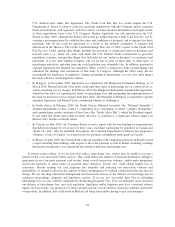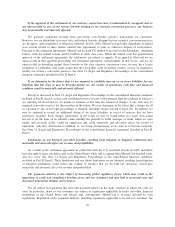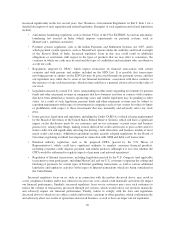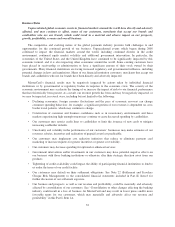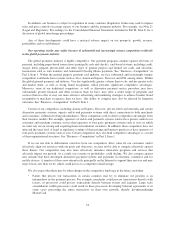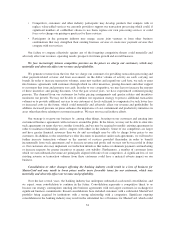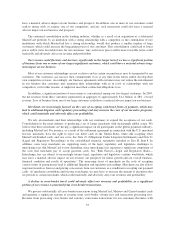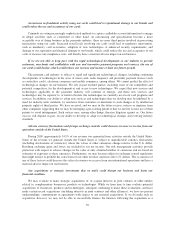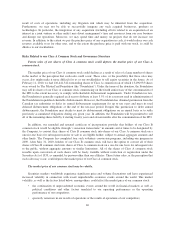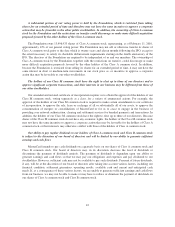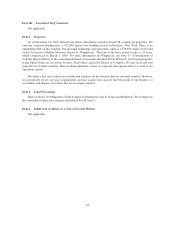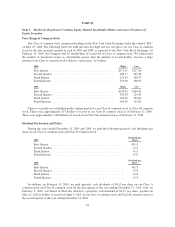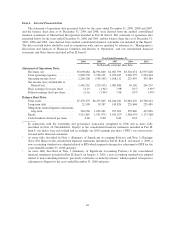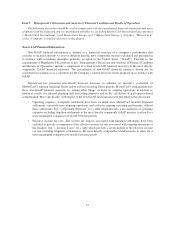MasterCard 2009 Annual Report Download - page 47
Download and view the complete annual report
Please find page 47 of the 2009 MasterCard annual report below. You can navigate through the pages in the report by either clicking on the pages listed below, or by using the keyword search tool below to find specific information within the annual report.We rely on the continuing expansion of merchant acceptance of our brands and programs. Although our
business strategy is to invest in strengthening our brands and expanding our acceptance network, there can be no
guarantee that our efforts in these areas will continue to be successful. If the rate of merchant acceptance growth
slows or reverses itself, our business could suffer.
Our business may be materially and adversely affected by the marketplace’s perception of our brands and
reputation.
Our brands and their attributes are key assets of our business. The ability to attract and retain cardholders to
our branded products depends highly upon the external perception of our company and industry. Our business
may be affected by actions taken by our customers that impact the perception of our brands. From time to time,
our customers may take actions that we do not believe to be in the best interests of our brands, such as creditor
practices that may be viewed as “predatory.” Moreover, adverse developments with respect to our industry may
also, by association, impair our reputation, or result in greater regulatory or legislative scrutiny. Such perception
and damage to our reputation could have a material and adverse effect to our business.
If we are unable to grow our debit business, particularly in the United States, we may fail to maintain and
increase our revenue growth.
In recent years, industry-wide offline and online debit transactions have grown more rapidly than credit or
charge transactions. However, in the United States, transactions involving our brands account for a smaller share
of all offline, signature-based debit transactions than they do credit or charge transactions. In addition, many of
our competitors process a greater number of online, PIN-based debit transactions at the point of sale than we do,
since our Maestro brand has relatively low penetration in the United States. We may not be able to increase our
penetration for debit transactions in the United States since many of our competitors have long-standing and
strong positions. We may also be impacted adversely by the tendency among U.S. consumers and merchants to
migrate from offline, signature-based debit transactions to online, PIN-based transactions because we generally
earn less revenue from the latter types of transactions. In addition, online, PIN-based transactions are more likely
to be processed by other ATM/debit point-of-sale networks rather than by us. Any of these factors may inhibit
the growth of our debit business, which could materially and adversely affect our revenues and overall prospects
for future growth.
General economic and global political conditions may adversely affect trends in consumer spending,
which may materially and adversely impact our revenue and profitability.
The global payments industry depends heavily upon the overall level of consumer, business and government
spending. General economic conditions (such as unemployment and changes in interest rates) and other political
conditions (such as devaluation of currencies and government restrictions on consumer spending) in key
countries in which we operate may adversely affect our financial performance by reducing the number or average
purchase amount of transactions involving payment cards carrying our brands. Also, as we are principally based
in the United States, a negative perception of the United States could impact the perception of our company,
which could adversely affect our business prospects and growth.
As a guarantor of certain obligations of principal members and affiliate debit licensees, we are exposed to
risk of loss or illiquidity if any of our customers default on their MasterCard, Cirrus or Maestro settlement
obligations.
We may incur liability in connection with transaction settlements if an issuer or acquirer fails to fund its
daily settlement obligations due to technical problems, liquidity shortfalls, insolvency or other reasons. If a
principal member or affiliate debit licensee of MasterCard International is unable to fulfill its settlement
obligations to other customers, we may bear the loss even if we do not process the transaction. In addition,
although we are not obligated to do so, we may elect to keep merchants whole if an acquirer defaults on its
37



